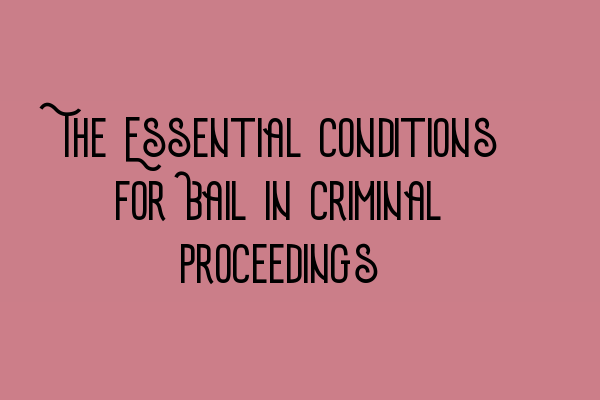The Essential Conditions for Bail in Criminal Proceedings
When a person is arrested and charged with a criminal offense, the court may grant bail if certain conditions are met. Bail is the temporary release of the accused from custody while they await their trial. It ensures that individuals do not languish in jail unnecessarily and allows them to continue their day-to-day activities until their case is resolved.
Conditions for Granting Bail:
1. Flight Risk: One of the primary considerations in granting bail is determining whether the accused is likely to flee or abscond. The court will assess factors such as the seriousness of the offense, the person’s ties to the community, employment status, family connections, and previous criminal history. A detailed analysis of these factors will help in determining the flight risk of the accused.
2. Public Safety: The safety of the public is of utmost importance. If the court believes that releasing the accused on bail poses a significant risk to the community, bail may be denied. Factors such as the nature of the offense, the potential for harm, and any previous convictions for violent crimes will be considered in assessing the risk to public safety.
3. Likelihood of reoffending: The court will also consider the likelihood of the accused committing further offenses while on bail. If there is evidence to suggest a high risk of reoffending, bail may be denied or additional conditions may be imposed, such as electronic monitoring or curfews.
4. Witness Intimidation: In certain cases, the court may refuse bail if there is a concern of witness intimidation. If it is believed that the accused may attempt to interfere with the investigation or intimidate witnesses, bail may be denied to protect the integrity of the judicial process.
5. Compliance with Court Orders: The accused’s willingness and ability to comply with any court orders, including attending court hearings and adhering to bail conditions, will be considered. Non-compliance with previous court orders may weigh against the grant of bail.
It is important to note that the conditions for granting bail can vary depending on the individual circumstances of each case. The court will assess the specific factors relevant to the case and make a decision based on the information presented.
Conclusion:
Bail is a crucial aspect of the criminal justice system, allowing accused individuals to maintain their freedom while awaiting trial. The conditions for granting bail, such as flight risk, public safety, likelihood of reoffending, witness intimidation, and compliance with court orders, must be carefully considered by the court. This ensures that the balance between the accused’s right to liberty and the protection of society is maintained.
To learn more about the SQE criminal law and practice, we recommend checking out these related articles:
- SQE 1 Practice Exam Questions
- SQE 1 Practice Mocks FLK1 FLK2
- SQE 2 Preparation Courses
- SQE 1 Preparation Courses
- SRA SQE Exam Dates
